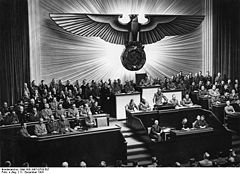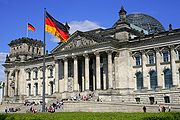
Reichstag (Weimar Republic)
Encyclopedia

Parliament
A parliament is a legislature, especially in those countries whose system of government is based on the Westminster system modeled after that of the United Kingdom. The name is derived from the French , the action of parler : a parlement is a discussion. The term came to mean a meeting at which...
of Weimar Republic
Weimar Republic
The Weimar Republic is the name given by historians to the parliamentary republic established in 1919 in Germany to replace the imperial form of government...
(1918–1933).
German constitution commentators consider only the Reichstag and now the Bundestag the German parliament. Another organ deals with legislation too: in 1867-1918 the Bundesrat, in 1919–1933 the Reichsrat and from 1949 on the Bundesrat. The Bundesrat or Reichsrat represents the German states.
In the Weimar Republic
Weimar Republic
The Weimar Republic is the name given by historians to the parliamentary republic established in 1919 in Germany to replace the imperial form of government...
(1919–1933), the members of government were responsible to the Reichstag. The parliament was elected according to a system of proportional representation. Votes were cast for nationwide party lists. Because of some special requirements, there were still incongruencies between the total share of votes and the share of mandates. Besides the Reichstag the Reichsrat
Reichsrat (Germany)
The Reichsrat was one of the two legislative bodies in Germany under the Weimar constitution, the other one being the Reichstag. After the end of German monarchy and the founding of the Weimar Republic in 1919, the Reichsrat replaced the Bundesrat as the representation of the various German...
, the organ of the states' representatives, had minor significance. The constitution provided the possibility of referendum
Referendum
A referendum is a direct vote in which an entire electorate is asked to either accept or reject a particular proposal. This may result in the adoption of a new constitution, a constitutional amendment, a law, the recall of an elected official or simply a specific government policy. It is a form of...
s, but the hurdles for such a referendum were high. It came only to two referendums (1926 and 1929), which were both unsuccessful.
There was no quota for getting a seat in the Reichstag. A party could win a seat with as little as 0.4 percent of the national vote--one seat for every 60,000 votes. Combined with the nationwide party-list system, this made it extremely difficult to form a stable government.
In 1920–1923 and from 1930 on, the Reichstag was often circumvented by two instruments not provided (as such) by the constitution:
- the extensive use of the powers that were granted to the presidentPresident of GermanyThe President of the Federal Republic of Germany is the country's head of state. His official title in German is Bundespräsident . Germany has a parliamentary system of government and so the position of President is largely ceremonial...
under the Emergency Decree in Article 48 of the constitution, - the use of enabling actEnabling actAn enabling act is a piece of legislation by which a legislative body grants an entity which depends on it for authorization or legitimacy the power to take certain actions. For example, enabling acts often establish government agencies to carry out specific government policies in a modern nation...
s, especially in 1919-1923, and then again the Enabling Act of 1933 that formed an important basis of Adolf HitlerAdolf HitlerAdolf Hitler was an Austrian-born German politician and the leader of the National Socialist German Workers Party , commonly referred to as the Nazi Party). He was Chancellor of Germany from 1933 to 1945, and head of state from 1934 to 1945...
's dictatorship.
With this latter enabling act, the Reichstag formally dispensed from itself exclusive responsibility for the exercise of the legislative power.
From then on the parliament only functioned as a body of ratification by acclamation, for the actions of the dictatorship. Even in its purely ceremonial role, the Third Reich's Reichstag convened only 20 times, for the last time on April 26, 1942. On January 25, 1943, five days before the expiration of the last Reichstag's period, the inaugural of a new body was postponed for another electoral term until January 30, 1947 on decree of the Führer.
When in 1948/1949 the West German politicians established a new democracy, they used the word Bund (federation) in place of Reich; in German constitutional history both terms were rather exchangeable. The new parliament became the Bundestag
Bundestag
The Bundestag is a federal legislative body in Germany. In practice Germany is governed by a bicameral legislature, of which the Bundestag serves as the lower house and the Bundesrat the upper house. The Bundestag is established by the German Basic Law of 1949, as the successor to the earlier...
, elected by mixed-member proportional representation--a mix of members elected from individual constituencies and state party lists. Additionally, to qualify for proportional representation, a party must either win at least five percent of the nationwide vote or three directly elected seats. To be elected head of government (Bundeskanzler), it is necessary to acquire an absolute majority in the Bundestag. Besides the Bundestag, the Bundesrat (representing the governments of the states) has a decisive vote on legislation if states' interests are concerned.
Seat

After the building was severely damaged in the Reichstag fire
Reichstag fire
The Reichstag fire was an arson attack on the Reichstag building in Berlin on 27 February 1933. The event is seen as pivotal in the establishment of Nazi Germany....
of February 1933, the national socialist Reichstag met in the Kroll Opera House. After the war the remaining, but heavily damaged building was prepared as a exposition hall. From 1999 on the Bundestag
Bundestag
The Bundestag is a federal legislative body in Germany. In practice Germany is governed by a bicameral legislature, of which the Bundestag serves as the lower house and the Bundesrat the upper house. The Bundestag is established by the German Basic Law of 1949, as the successor to the earlier...
uses the Reichstag as its permanent building. The official address is Platz der Republik 1.

